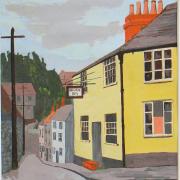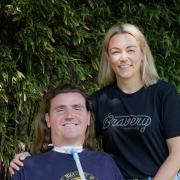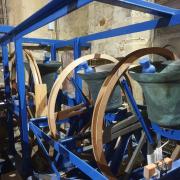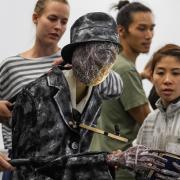A few precious drops of blood that were taken from Sir Winston Churchill have emerged for sale at auction.
The sample was collected in 1962 when the ‘blood, toil, tears and sweat’ orator was at The Middlesex Hospital being treated for a fractured hip.
Student nurse Patricia Fitzgibbon asked if she could keep the small glass tube that was labelled ‘Sir Winston S Churchill WWB9’ and her request was granted. Following her death it is to be offered for sale at Duke’s of Dorchester in Dorset on March 12.
In 1962, Churchill, aged 87, was holidaying in Monte Carlo when he reportedly fell out of his bed, sustaining a fractured hip. He was flown back to London in an RAF VC10 jet at the request of the Prime Minister Harold Macmillan. He spent several weeks recuperating in the Woolavington Wing for private patients at the hospital during which time the phial of blood was taken. His recovery was slow as he contracted bronchitis and pneumonia which in turn led to thrombosis. It was widely anticipated that he would not survive the ordeal at his advanced age.
The blood was about to be thrown away when nurse Fitzgibbon was given permission to keep the 7cm-long tube. In 2010 she recalled that, despite the severity of his injury, Churchill remained steadfast throughout his stay.
She said: “While the ward sister generally kept nurses out of his room, I did have occasional duties to carry out.
“I remember that he would never settle at night until after he had read the first edition of all the daily newspapers which he had specially delivered. He habitually smoked cigars in bed … [and] regularly mixed the first and second courses of his meal into one bowl before eating it!”
The blood – taken three years before Churchill’s death – is going under the hammer with an estimate of £300-600.
Timothy Medhurst from Duke’s said: “It is impossible to put an accurate estimate on this unique piece of history.
“There are just a couple of drops in the phial that is clearly labelled.
“At the time this blood was taken Churchill had already experienced a catalogue of injuries.
“So to have another devastating injury occur at such an old age was a threat to his stalwart ‘British Bulldog’ image.
“Though Churchill largely relied on his walking stick by the time this broken hip occurred, the operation to fix the fracture would have a caused a shortening in his leg and photographs following 1962 always show Churchill leaning on his iconic walking stick.
“This injury was also at a poignant moment in Churchill’s personal life – his beloved poodle Rufus II died whilst he was in hospital recovering.
“The blood will be sold together with a signed declaration by Patricia Fitzgibbon detailing the circumstances in which she acquired the phial.
“It is probably the first time that such a personal piece of Churchill’s history has been offered on the open market.
“This year marks the 50 year anniversary of Churchill’s death. The blood is a poignant reminder of an injury which marked the beginning of the end for Churchill and as such, we expect there to be great interest in it. It could sell for thousands.”
On May 10, 1940, Churchill became Prime Minister and when he met his Cabinet on May 13 he told them: “I have nothing to offer but blood, toil, tears and sweat.”
He repeated that phrase later in the day when he asked the House of Commons for a vote of confidence in his new all-party government that would stand up to the Nazi aggressors.
Also in the sale are a set of Churchill’s ‘The Second World War’ books, which he has inscribed as a gift for Mabel Johnson, who worked with Lady Spencer Churchill during the war.
These have an estimate of £4,000-8,000
***
READ ON
• General election 2015 in Dorset - candidates and constituencies - The next general election in the UK takes place on Thursday 7 May 2015. We’ve put together a handy Dorset guide to polling day; including candidates for each constituency and the results from 2010.
• Cuts to bus services in Dorset - opinion page - Dorset has experienced some of the biggest cuts to bus services in the whole country. Rural areas have taken the hardest hit, but do we care that we’ve left some people stranded? Alice Cooke looks at the facts behind the cutbacks.



























